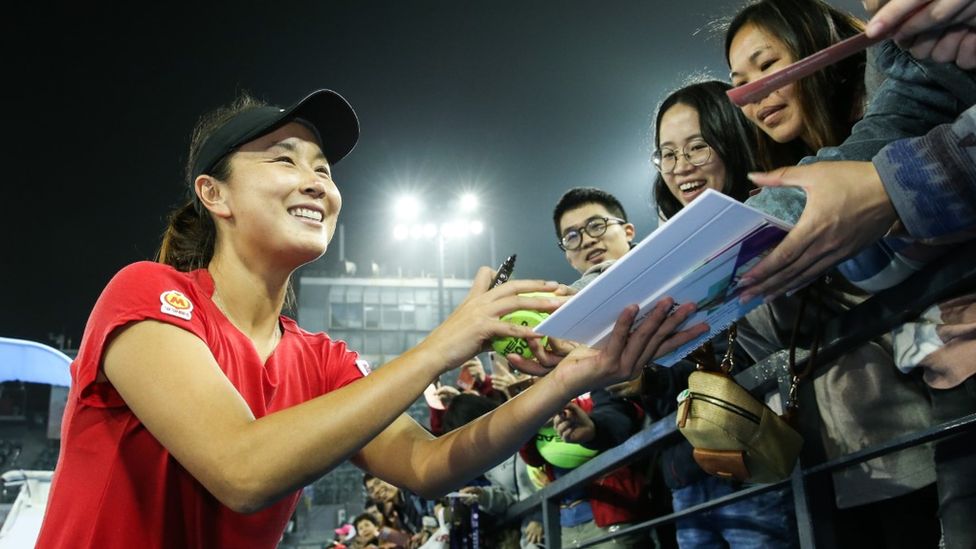Peng Shuai: How China censored a tennis star
- Published

Peng Shuai, one of China's most popular tennis players, has denied saying she made accusations of sexual assault against a former senior politician on social-media site Weibo.
Her original post was made on 2 November, after which her personal feed was censored, leading to concerns over her well-being.
We've looked at the events that followed to understand the online censorship techniques used against Ms Peng.
What happened to Ms Peng's posts?
She published a post on Weibo on 2 November, alleging she had been coerced into sexual relations with Zhang Gaoli, a former Chinese vice-premier.
In it, Ms Peng said that originally, she hadn't agreed to a sexual relationship with him and "kept crying," but eventually she had "agreed."
That post disappeared quickly - probably within the hour.
Using the Wayback Machine internet tool - which allows you to scroll back in time online - we can see that by the end of that day there was no trace of the post.
We then looked at Ms Peng's timeline and found that six more posts had gone, and she herself has not posted on Weibo since 2 November.
This isn't the first time a high-profile athlete has been censored.
In 2020, outspoken former China international footballer Hao Haidong was also censored on the internet, along with his wife, Ye Zhaoying, a retired badminton player, after he openly called for the removal of China's ruling Communist Party.
What happened to her online followers?
Weibo users, just like those on Twitter, can normally post comments in reply to posts.
However, comments on Ms Peng's own timeline were blocked - making it impossible for her followers (more than half a million of them at that time) to engage in a conversation.
It also appears that certain specific search terms were temporarily blocked at the time - so if a user typed Ms Peng's name, for example, results were restricted.
The only search result for her name that showed up on Weibo is a post from the French Embassy in Beijing on 22 November, expressing concern about the lack of information on Ms Peng.
There is some other content relating to Peng Shuai currently available on Weibo - but it's just video clips from old events.
The Women's Tennis Association (WTA) decided to suspend all tournaments in China, including Hong Kong, amid concern that Ms Peng "is not allowed to communicate freely" and seems to have been "pressured to contradict her allegation of sexual assault".
In addition, Weibo posts by other users at that time which referred to Ms Peng were removed.
On 3 November, Chinese tennis commentator, Ouyang Wensheng, wrote: "Hope you are safe" and "How desperate and helpless she must have been". Both these posts have been taken down.
To navigate around the censors, some have come up with creative solutions.
Instead of referring to Zhang Gaoli directly, Weibo users have referred to him by similar names, or names that have the same initials in Chinese.
However, the authorities are wise to this and posts that try to evade the censors in this way have also been quickly taken down.
Mainstream state media have been steering clear of the story.
Search engine Baidu shows only state media reporting on Zhang Gaoli. And if you search for "Peng Shuai", the only results that show up are from 2020 and earlier.
Other social-media sites, such as Douyin (Chinese TikTok) and popular video-sharing platforms Kuaishou and Bilibili, also have limited search access for sensitive terms relating to the story.
On question-and-answer website Zhihu, no results appear when the name "Peng Shuai" is entered. However, when "Zhang Gaoli" is searched for, there are posts portraying him as a heroic leader.
What about her public appearances?
A few days after Ms Peng's original post in November, an online campaign, using the hashtag #WhereIsPengShuai?, began circulating and started trending on Twitter.
In the days and weeks following her original post, she was seen in public on several occasions.
One was in a video posted on 20 November, where Ms Peng was having a meal in a restaurant with other people.
Ms Peng also appeared at a sporting event in Shanghai in December, where she was interviewed by a Singaporean Chinese-language newspaper. She said then she'd never written that anyone had sexually assaulted her.
On 5 February, Ms Peng and the International Olympic Committee (IOC) President, Thomas Bach, met for dinner at the Olympic Club in Beijing.
The in-person meeting took place after a series of telephone conversations between the two in the past few months.
Ms Peng has also given an interview to the French publication L'Equipe during the Winter Olympics, in which she again said she'd never stated that anyone sexually assaulted her, and that there had been a "huge misunderstanding."
The WTA said the interviews she's given do "not alleviate" its concerns about her well-being.
China has been reluctant to speak about the case officially.
Foreign ministry spokesman, Wang Wenbin, told journalists in December that China "opposes the politicisation of sports". This remark, as previous ones related to the issue, was later excluded from the official transcript of the press conference.
Additional research by Paul Myers